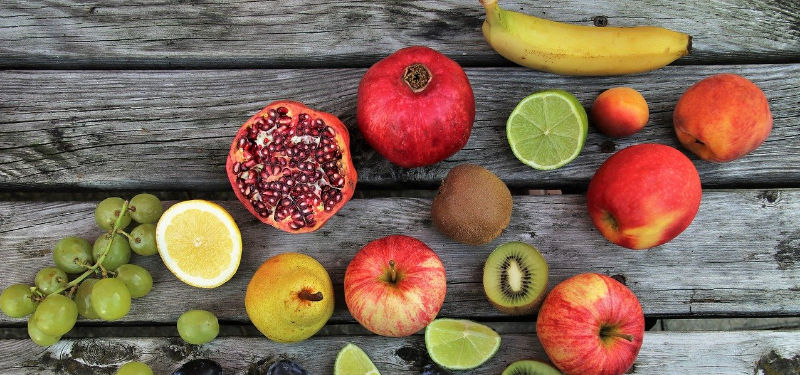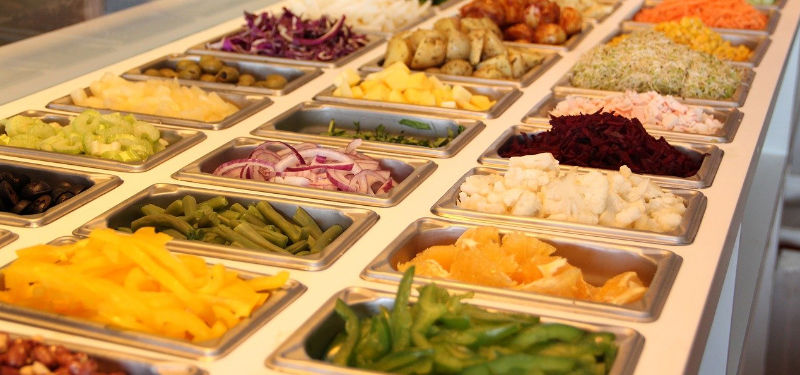How to Eat Healthy As A Student
Posted on Tuesday, July 27, 2021
To keep this site free for consumers, we receive compensation for customer referrals.
Many young people headed off to college fear the dreaded “freshman 15.” But weight gain isn’t the only drawback of poor eating habits. Unhealthy nutrition can cause increased fatigue, greater susceptibility to illness, difficulty concentrating, and a higher risk of depression and anxiety. It’s even been linked to lower grades! For college students living on campus, here are some healthy eating tips to keep your academic performance (and your waistline) in check.

How Much Should a College Student Eat?
It’s recommended that people between the ages of 19-30 should consume 2000 calories a day. However, everyone’s body is different, so there is no one magic number for everyone. How much you should eat each day will depend on your gender, body type, and activity level. Consider your lifestyle and ideal body weight.
In general, student diets should be high in protein and grains. Men will require a serving or two more than women.Men and women should enjoy three servings of dairy and four to five servings of fruit and vegetables each day. Students should look to minimize foods high in sugars and trans fats.
Employ Fresh Meal Delivery Services
Meal delivery services aren’t just for busy professionals who want to eat healthy. They can be a good friend to busy college students too. Many offer pre-prepared and frozen meals that you can simply pop in the microwave—no kitchen equipment required.
Meal delivery services aren’t the cheapest eating option, but they are guaranteed to be healthier than pizza and fast food. And you can customize them to meet your budget, diet, and frequency requirements. Over time, they can save you money by reducing the amount of energy drinks you need, doctor visits, and lowering the need for supplemental snacks since unhealthy meals tend to not keep you as full.
Never Skip Breakfast
Breakfast is called the most important meal of the day for a reason. Getting in the proper nutrition early in the morning will help you to power through those classes. It will keep you more energized and able to avoid unnecessary snack breaks. Are you the type who never has time for a sit-down breakfast in the dining hall? Stock your dorm room with nutritious and quick breakfast options like yogurt, granola, and fruit.

Include All of the Food Groups
The U.S. Department of Health employs the My Plate symbol as a guideline for healthy eating. It highlights the portions of the five basic food groups that all people should eat each day. To remind yourself to eat healthy, tape a picture of it up by your desk. Whether you’re in the cafeteria, in your dorm room, or eating out, make your meal mimic the MyPlate icon. Your diet should consist of about 50% fruits and vegetables, 25% protein, and 25% dairy and grains.
Make Healthy Food Swaps
Your brain needs food to function at its optimal level. But it doesn’t necessarily need Ramen Noodles and French fries. Learn how to make healthy food swaps so that you can get in your calories without all the added fats and sugars. Here are some examples of healthy food substitutions:
Drink water instead of soda or sugary beverages. And while you’re at it, drink plenty of it. Staying hydrated will give you more energy and boost your overall health.
Choose grilled or baked foods instead of deep-fried ones.
When it comes to dessert, choose fruit instead of baked goods and sweets.
Aim for whole grains instead of refined grains for your carb choices.
Opt for low-fat, skim, or alternative dairy products instead of whole milk.
Plan Ahead & Keep it Balanced
Studies have shown that students who eat three balanced meals a day exhibit better academic performance than those who don't. It will keep you energized throughout the day and keep your metabolism kicking. Try to plan regular meal and snack times in your day not only to help boost your performance but also because doing so can help keep your hectic schedule on track.
Don’t always have time to wait in the dining hall line? Plan ahead. Stock your dorm room with healthy snacks to carry in your backpack. Whether you’re rushing between classes or up late studying, having snacks on hand will help you resist the temptation to visit the fat-and-sugar-packed vending machine.

Practice Restraint In The Dining Hall
The unlimited food choices offered with a residential student meal plan can be a dream come true for an underclassman on a budget. But the dining hall can also be a nightmare for your body. Be on your way to mastering the dining hall with these tips:
Remember the My Plate ratio when building your tray.
Use smaller plates. This will help you choose smaller portions and still feel like you’re eating a full plate.
Get only the portion you need on the first go-round and don’t go back for seconds.
Take advantage of the salad bar but aim for the fresh veggies and not the mayonnaise-laden salads.
Save the sundae bar as a treat once a week and opt for healthy dessert options most days (like fresh fruit or yogurt).
Most cafeterias will offer meatless or vegan meal options. Give them a try once in a while.
If you focus on healthy eating habits now, you can start your college career off right and adopt a healthier lifestyle for the future.
Top Posts
- Exploring Computer Monitors
- Exploring the Benefits of Video Doorbells
- Maintenance for Smoke Detectors
- Treadmills: The Ultimate Guide to Getting Fit
- Rice Cookers for Every Kitchen
- Curling Irons for All Hair Types
- Better Dental Health with Electric Toothbrushes
- Meal Delivery for Celiac Disease & Gluten Intolerance
- Pet Insurance for Cats
- Air Purifiers for Allergies


